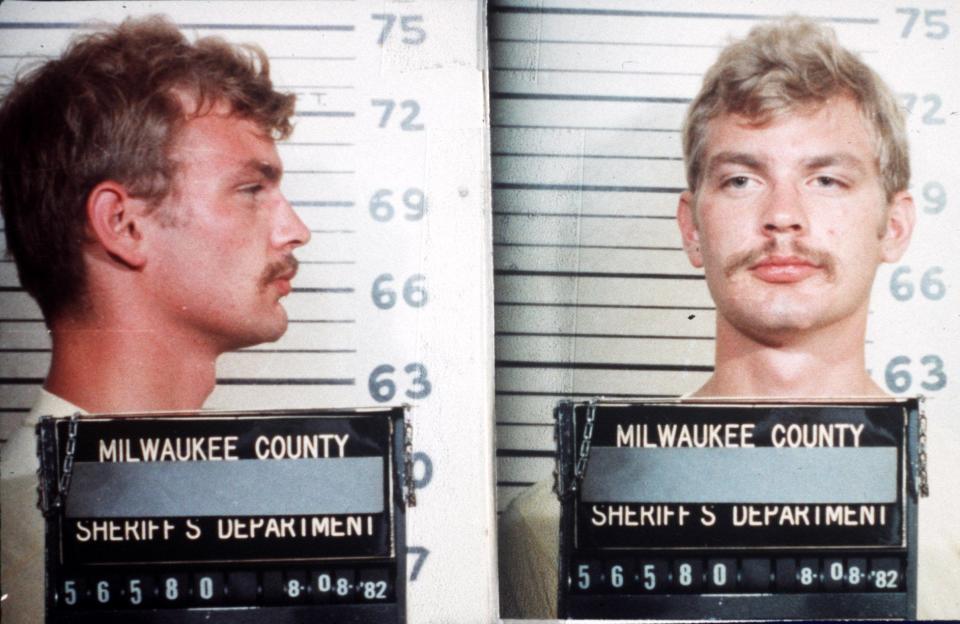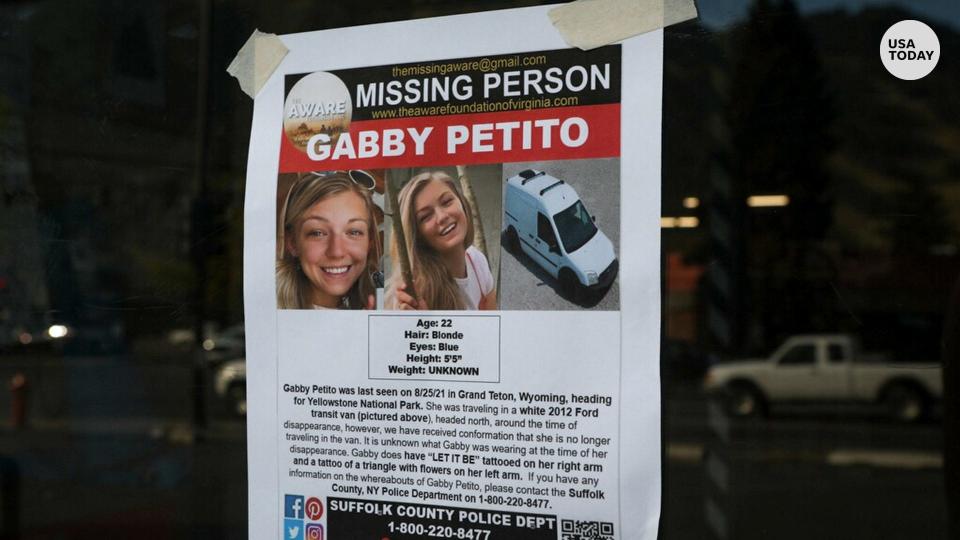Jeffrey Dahmer series is gruesome. It's also No.1 on Netflix. What does that say about us?
- Oops!Something went wrong.Please try again later.
Jeffrey Dahmer has been dead for nearly 30 years. Yet his gruesome story continues to captivate viewers across the country, while haunting the families of his real-life victims.
"Monster: The Jeffrey Dahmer Story," the latest (and sixth) project about Dahmer (played by Evan Peters), reenacts the titular serial killer's grisly murdering spree over a 13-year period. Unlike previous adaptations, such as 2017's "My Friend Dahmer," this 10-part series doesn't shy away from showcasing unsettling scenes of homicide, sexual assault and even cannibalism. The graphic nature of this adaptation has drawn criticism from the victims' families.
"I don't need to watch it. I lived it," Rita Isbell, the sister of Dahmer victim Errol Lindsey, wrote in an Insider essay. "Netflix should've asked if we mind or how we felt about making it. They didn't ask me anything. They just did it."
The mother of Tony Hughes, who was the focus of an episode titled "Silenced," also condemned the series Sunday. "I don't see how they can use our names and put stuff out like that out there," Shirley Hughes told the Guardian.
'Monster: The Jeffrey Dahmer Story': Evan Peters stars as serial killer in new Netflix series: What we know
But like a car crash, many can't look away. It's Netflix's biggest show debut since "Stranger Things" Season 4, with 196.2 million hours of viewership, according to new data.
The chilling series' success should come as no surprise.
It's kinda weird that you tweet about this like it's fiction...This 'disturbing scene' is a whole families trauma.
— Miz (@miztakesno) September 24, 2022
From the archives: USA TODAY's coverage of the Jeffrey Dahmer case as it really unfolded
"We have become consumed by entertainment from horror and crime, which has been culturally and socially accepted for decades. But what seems to be happening now is we consume it so regularly, we don't consider the 'true' in true crime. We don't consider the real impact these crimes had and continue to have," says Tristin Engels, a licensed clinical forensic psychologist.
Therein lies the problem, trauma experts warn: We've become so enamored with gossiping about these cases, we've tossed aside all empathy.
Has true crime desensitized us to real-life tragedies?
Behind every criminal case is a suffering family. The "Serial" podcast about the killing of Hae Min Lee, for instance, rallied support for Adnan Syed, reopening wounds for Lee's family.
“This is not a podcast for me. This is real life,” her brother, Young Lee, said during a recent hearing.
Part of our true crime obsession stems from the human impulse to understand the mind of a sociopath or murderer. It's normal, to some degree, to wonder about something so shocking, bizarre and unfamiliar.
And sometimes we lose ourselves in other people's "worst moments in order to avoid anything we might be dealing with," says licensed professional counselor Jessica MacNair. We turn others' horrors into dinner-table conversations.
"By focusing on someone else's trauma, it brings you to this place of, 'At least my life isn't as bad.' And it makes you feel better about your own experiences," she explains. However, this tendency to treat tragedies as fodder is making us "more self-centered and less involved with our empathy and concern for other people," she warns. Already, the renewed interest in Dahmer has sparked disturbing social media posts about the killer's attractiveness — reminiscent of similar comments about Ted Bundy, who was portrayed by Zac Efron in Netflix's "Extremely Wicked, Shockingly Evil and Vile."

"It shows how, as a culture, we're so intrigued by horror and crime that we forget that not all of it is fictional," Engels adds.
Like scripted Hollywood films, dramatized adaptations of real events, like "Monster: The Jeffrey Dahmer Story" "hook you in, build up suspense and add effects," making it difficult for some to consider those actually affected.
'Re-traumatizing': Netflix's Dahmer series forces some to 'relive this experience'
Trauma can't be forgotten, says Elaine Miller-Karas, co-founder and director of the Innovation of Trauma Resource Institute and author of "Building Resiliency to Trauma." It takes time and therapy to heal, especially when it was as violent and publicized as Dahmer's murders.
"When you lose a family member, that person has a piece of your heart for the rest of your life. And having to see these images or scenes resembling what may have happened to your family member can be very triggering," Miller-Karas says. Research has shown that greater exposure to graphic or bloody images in the media is associated with higher acute stress and increased post-traumatic stress symptoms.
I’m not telling anyone what to watch, I know true crime media is huge rn, but if you’re actually curious about the victims, my family (the Isbell’s) are pissed about this show. It’s retraumatizing over and over again, and for what? How many movies/shows/documentaries do we need? https://t.co/CRQjXWAvjx
— eric perry. (@ericthulhu) September 22, 2022
As of Monday, #DahmerNetflix now has over 500 million views on TikTok.
"It just keeps coming up again and again, and it's something that these families will have to face on a regular basis," MacNair says.
Remember the victims, not the perpetrators
It's possible to portray trauma realistically and responsibly. But how we share certain stories should be up to the people impacted in real-life, experts say.
Even though consent isn't legally required to document public crimes, the least we can do, as human beings, is consider those who are directly affected. Dahmer's victims' families say they did not approve the production of their real-life trauma.

Everyone's talking about Gabby Petito: But they're having the wrong conversation, experts say
"Involve the families to seek their full consent. Have them be involved in the production of anything that is being put out there. Also get them any kind of trauma therapy or counseling they might need to help heal," MacNair recommends. Otherwise, it's a "gigantic violation."
When done correctly, these stories have the power to spread awareness and bring belated justice. But think about how many Dahmer or Bundy films and shows have been released: Dissecting someone else's trauma with graphic, violent scenes —without permission — does a "disservice to families," says Miller-Karas.
Jeffrey Dahmer killed 17 people: These are the victims and what we knew about them
This article originally appeared on USA TODAY: Jeffrey Dahmer Netflix series is horrific yet hugely popular. Why?

